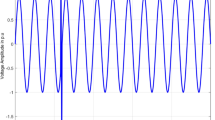Abstract
This chapter presents an Attribute Grammar capable of modelling power system signals. Primitive pattern selection, linguistic representation, and pattern grammar formulation are the sub problems of tackled. The recognition of power system waveforms and to the measurement of its parameters is proven to easily be handled using syntactic pattern recognition techniques. Attribute grammars are used as the model for the pattern grammar because of their descriptive power, which is due to their ability to handle syntactic as well as semantic information. In order the functionality of the proposed system to be tested, a software implementation has been developed using waveforms and data provided by the Independent Power Transmission Operator (IPTO) in Greece. The proposed methodology will be applied to the implementation of an efficient protective relay that would efficiently prevent safety problems and economic losses caused by faults presented in power systems.
Access this chapter
Tax calculation will be finalised at checkout
Purchases are for personal use only
Similar content being viewed by others
References
Saha MM, Rosolowski E, Izykowski J, Artificial Intelligent Application to Power System Protection, Proceedings of the Eleventh National Power Systems Conference (NPSC`2000), Bangalore, New Delhi, Allied Publishers 2000, 2:797-600, 2000.
Jinglin Xu,Uwe Meyer-Baese, Real Time Digital Signal Processing in Power Systems using FPGAs: An Analysis of Time-Varying Waveform Distortions and Power Disturbances, April 3, 2011, ISBN-13: 978-3844321722.
Earley J, An efficient context-free parsing algorithm, Communications of the ACM, 13(2) 94-102, 1970. doi:http://doi.acm.org/10.1147/362007.362037.
Dimopoulos AC, Pavlatos C, Papakonstantinou G, A platform for the automatic generation of attribute evaluation hardware systems, Computer Languages, Systems & Structures, 36(2):203-222, 2010.
Xilinx Inc., www.xilinx.com.
Aho V, Ullman JD, The Theory of Parsing, Translation, and Compiling, Vol. I: Parsing of Series in Automatic Computation, Prentice Hall, Englewood Cliffs, New Jersey, 1972.
Younger DH, Recognition and parsing of context-free languages in n 3, Information and Control, 10:189-208, 1967.
Graham SL, Harrison MA, Ruzzo WL, An improved context-free recognizer, ACM Trans. Program. Lang. Syst., 2(3):417-462, 1980.
Stolcke A, An efficient probabilistic context-free parsing algorithm that computes prefix probabilities, Computational Linguistics, 21(2):167-201, 1997.
Chiang Y, Fu K, Parallel parsing algorithms and VLSI implementations for syntactic pattern recognition, IEEE Transactions on Pattern Analysis and Machine Intelligence, 6:302-314, 1984.
Cheng HD, Fu K, Algorithm partition and parallel recognition of general contextfree languages using fixed-size VLSI architecture, Pattern Recognition, 19(7):361-372, 1986.
Ciressan A, Sanchez E, Rajman M, Chappelier JC, An fpga-based coprocessor for the parsing of context-free grammars, Proceedings of the 2000 IEEE Symposium on Field-Programmable Custom Computing Machines (FCCM ’00), IEEE Computer Society, Washington, DC, USA, pp. 236-247, 2000.
Bordim J, Ito Y, Nakano K, Accelerating the CKY parsing using FPGAs, IEICE Transactions Information & Systems, E-86D(7):803-810, 2003.
Pavlatos C, Panagopoulos I, Papakonstantinou G, A programmable pipelined coprocessor for parsing applications, in: Workshop on Application Specific Processors (WASP) CODES, Stockholm, 2004.
Pavlatos C, Dimopoulos AC, Koulouris A, Andronikos T, Panagopoulos I, Papakonstantinou G, Efficient reconfigurable embedded parsers, Comput. Lang. Syst. Struct., 37(2):196-217, 2009.
Trahanias P, Skordalakis E., Syntactic pattern recognition of the ECG. IEEE Transantions on Pattern Analysis and Machine Intelligence (PAMI), vol. 12, no. 7, July.
Author information
Authors and Affiliations
Corresponding author
Editor information
Editors and Affiliations
Rights and permissions
Copyright information
© 2016 Springer-Verlag Berlin Heidelberg
About this chapter
Cite this chapter
Pavlatos, C., Vita, V. (2016). Linguistic Representation of Power System Signals. In: Karampelas, P., Ekonomou, L. (eds) Electricity Distribution. Energy Systems. Springer, Berlin, Heidelberg. https://doi.org/10.1007/978-3-662-49434-9_12
Download citation
DOI: https://doi.org/10.1007/978-3-662-49434-9_12
Published:
Publisher Name: Springer, Berlin, Heidelberg
Print ISBN: 978-3-662-49432-5
Online ISBN: 978-3-662-49434-9
eBook Packages: EnergyEnergy (R0)




